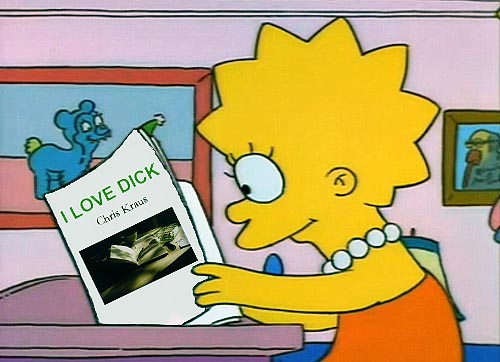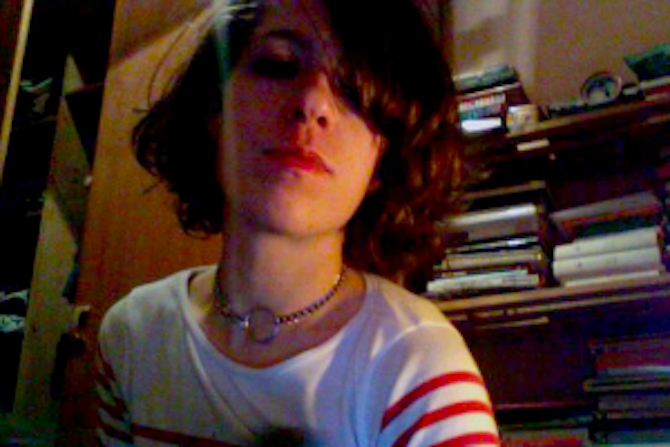Search
To search for an exact match, type the word or phrase you want in quotation marks.
A*DESK has been offering since 2002 contents about criticism and contemporary art. A*DESK has become consolidated thanks to all those who have believed in the project, all those who have followed us, debating, participating and collaborating. Many people have collaborated with A*DESK, and continue to do so. Their efforts, knowledge and belief in the project are what make it grow internationally. At A*DESK we have also generated work for over one hundred professionals in culture, from small collaborations with reviews and classes, to more prolonged and intense collaborations.
At A*DESK we believe in the need for free and universal access to culture and knowledge. We want to carry on being independent, remaining open to more ideas and opinions. If you believe in A*DESK, we need your backing to be able to continue. You can now participate in the project by supporting it. You can choose how much you want to contribute to the project.
You can decide how much you want to bring to the project.

A scene in the series entitled I Love Dick, directed by Sarah Gubbins and Jill Soloway (based on the book of the same title written by Chris Kraus), is quite a good reflection of certain narratives that are still dominant in many professional fields. The scene features a heterosexual couple, Chris and Sylvere, and an artist, Dick, dining at a restaurant. The ensuing dialogue is fictitious, but the story is real:
Dick: ‘What do you do?’ She was almost surprised to be asked that question.
Chris: ‘Oh, I’m a filmmaker. I make films … experimental in bent … My latest film was invited to screen at Venice, but then, for complicated reasons that’s not happening.’ Note that Chris mentions a project she has been working on. Dick mansplains how she should have gone about it to avoid her film falling through, and asks another question.
Dick: ‘What’s it about?’
Chris: ‘The film? It’s about a couple, a woman really. She is representative of all women. Actually. And how society’s expectations of women are just crushing. Oh, and also …’. Dick interrupts with a chuckle, and looking at the other guy, an accomplice and immediate target of his male camaraderie, jokes.
Dick: ‘So your film is an exercise in boredom? How boring is it to watch women being oppressed?’ Dick continues to give his opinion.
Dick: ‘You don’t want to be a filmmaker, ’cause if you did, you’d be one. It’s a question of desire, not talent, or timing or circumstance. Pure want. Which you don’t possess.’ Naturally, she begins to get angry.
Chris: ‘If all it took was desire, then we’d have a horde of great films by women artists. Instead there’s this graveyard of unmade work.’ Chuckles from Dick.
Dick: ‘Maybe this supposed graveyard of unmade films by women filmmakers are there because they weren’t, ultimately, that good.’
Chris: ‘Jane Campion, Miranda July. Uh, Sally Potter.’
Here we have two gestures. The first one is hers and indicates doubt, uncertainty, the search for, and acknowledgement of, references. This is very necessary when one is outside the dominant narrative, or rather when you don’t have it and therefore you need your own references, other references, that speak of you, with you, like you, using your words and posing your doubts. The other gesture is his and reveals security, taking for granted that he is in the right and that he has obtained everything through sheer hard work. The privileges, the visibility, not acknowledging the importance of narratives other than his own which, funnily enough, is the logical, dominant narrative.
To define the question from the artistic sphere: Are the opportunities, the visibility and recognition of men and women symmetrical? Some people, like Dick, will believe they are, that everyone is dealt the same hand: ‘Pure want. … Men and women alike. Is it hard to make a film? Sure. Do people do it? Yes. So it must not be that hard.’ Incredulous women’s laughter, followed by annoyance.
In The Argonauts, Maggie Nelson, poet, writer and lecturer at CalArts, tells us:
‘My writing is riddled with such tics of uncertainty. I have no excuse or solution, save to allow myself the tremblings, then go back in later and slash them out. In this way I edit myself into a boldness that is neither native nor foreign to me.
At times I grow tired of this approach, and all its gendered baggage. Over the years I’ve had to train myself to wipe the sorry off almost every work e-mail I write; otherwise, each might begin, Sorry for the delay, Sorry for the confusion, Sorry for whatever. One only has to read interviews with outstanding women to hear them apologizing. (Monique Wittig). But I don’t intend to denigrate the power of apology: I keep in my sorry when I really mean it. And certainly there are many speakers whom I’d like to see do more trembling, more unknowing, more apologizing.’
These are problems common to many professional women I know. We share the sad and terrible concept of the impostor syndrome, according to which we often doubt whether we actually deserve our position, our place. Doubting ourselves, doubting our achievements: perhaps we were awarded that position to fill quotas. We’ll probably be given the sack as soon as we have kids or stop looking young, or as soon as they discover that we have misgivings about the project. Perhaps it was just good luck, a winning streak, not something stable or something that we are responsible for. This fragility makes us fight fiercely, without hope. These are the doubts that hurt and break us, the kind of insecurity we should conquer. Photos of tote bags that read ‘Carry yourself with the confidence of a mediocre white man’ could be found on the Internet. I think all women understand the tongue-in-cheek nature of the remark. Other kinds of doubts, being right or not, draw us towards other stories.
Feminisms are theories and practices of doubt, they express the uncertainty of progressing without historical references, or cases when these have been erased and then need to be restored by the same people absent from the narrative. Feminisms often consist in agreements and splits, recoveries and leaps forward, in theories and practices that can – and actually do –change the world. It is often unnecessary, and may even be superfluous, to announce things as being ‘feminist’. Feminism can be offered and put into practice in our gestures and actions. Perhaps women work under many oppressions. Writing this text, I find myself filling it with doubts and insecurities — ‘perhaps’, ‘maybe’.
One of the tools historically used to oppress those of us socialised as women continues to be love. Loving someone makes us absolutely vulnerable. We have been trained and constructed in romantic love and caring. Ways of loving are still one of the cores of many feminisms: how can we deconstruct the story of Prince Charming, of heterosexuality and monogamy, of women finding fulfilment through their partners or motherhood? Doing away with the idea that the point of reference is always someone, something, never oneself. As if our experiences and references were neither valid nor sufficient. Having to deal with love and emotions in theory and in practice could sound like a pastime for wealthy women, but to speak of love is to speak of everyday life, of public and private space, of intimacy and politics.
Non-Slave Tenderness by Lucía Pino at Fundació Miró’s Espai 13 presented some of these elements: fragility, doubt, potential and strength. Control of the situation and emotions. The very title refers to a new possible strength: the capability of being tender without being a slave to what we protect and look after. Without depending on it. A sound enveloping you in the gallery like an embrace, cables like guts scattered around the floor. Bright lights that could be looked at directly without our eyes hurting; fractures and folds. Tenderness as a brutal act, stronger than fear, stronger than those who dominate us. Our tenderness is ours: we feel it, it makes us tremble but it also gives us warmth. Being able to feel this in such a bleak, shitty world.
I make references to female artists who doubt, whose hands are unsteady. I’m speaking of vulnerability and of not seeing things clearly. This baggage, as we learn from Maggie Nelson, is marked by gender. Does gender matter in the art world when it comes to having great responsibilities such as running art centres and museums?
The news that three female directors of international museums and art centres were to be dismissed recently went viral. (Incidentally, this would have been impossible in Barcelona, as none of the directors of the main art centres are women.) Helen Molesworth, chief curator at the Museum of Contemporary Art, Los Angeles (MoCA), María Inés Rodríguez from the Musée d’Art Contemporain de Bordeaux (CAPC), and Laura Raicovich, president and executive director of New York’s Queens Museum. All three have been asked to leave their positions. Their greatest ‘mistakes’ could well be understood as bad qualities in women, and in general even, although they are once again marked by the baggage of gender. I’ll take the liberty of translating the accusations into the language of feminism and posing the situation as if the museum were a Dick-like partner. Given that women are always considered to be emotional (and consequently unstable and irrational), let’s pretend that the museum you work in is your partner, your Dick. All love and emotions; absolute dedication that ends in drama or with a woman rising angrily and leaving the dinner table.
Helen Molesworth had been ‘undermining the museum’, which, translated, means Oh dear, Helen was too insistent on placing the work of women and sacrosanct geniuses at the same level. You hurt people’s feelings with that, Helen. We know that masculinity is fragile, that it is rife with fissures. There was no need to point out that women can be as good (or even better, wow!) than men in their professions.
María Inés Rodríguez was ‘too demanding’. In other words, she was very needy, the sort of person who asks you to do things, to get off your arse. Boyfriends and museums are put off by that sort of thing because, suddenly, having to devote time and resources to things that seem unimportant can be quite confusing. Laura Raicovich ended up being ‘too political’. That caused a stir too. Too political, too much of a killjoy, not sly enough in her position. Women in politics are dodgy. How come you voiced your opinion, Laura? All of you dismissed for being excessive. Too something or other.
I’ve always tried to understand feminisms as gestures of love and generosity triggered by anger. Like something that allows you to be at once a fissure and the axe that caused it; vulnerability and power in personal and collective terms. Perhaps it would be easier for us to understand one another if, besides recognising and accepting our differences, we also uncertainly shared our vulnerabilities, our fissures and broken parts. Knowing that the game and its rules are tricky and that the same games are played with different cards.
When you think you own the truth and don’t distrust or suspect what falls your way, you end up being like Dick, thinking that everything was simply gained through your hard work and willpower. As if the same system worked for everyone.
In other words, you’re cocksure of yourself, Dick.

Irina Mutt she keeps on quoting Annie Sprinkle.
"A desk is a dangerous place from which to watch the world" (John Le Carré)